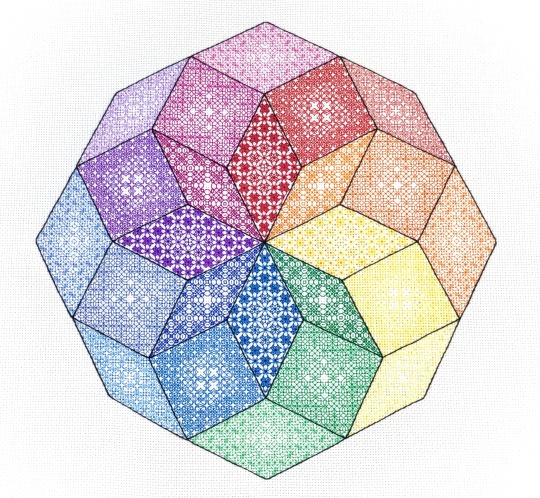Don't wanna be here? Send us removal request.
Text
is this the place where I can shitpost to my heart's content? I think it is
0 notes
Text
One of the really amusing things about college is that if you pay attention you sometimes can discern some of your professor's favorite pet concepts.
For instance, in my Topology course this semester, the Zariski topology has come up at least once in every single homework set so far, and in multiple lectures.
And okay, that's not that weird. The Zariski topology is a really important object in a LOT of fields, especially algebraic geometry. And discussing it at length is a really pedagogically sound move because the Zariski topology is a good example of a topology with a very well motivated structure (the closed sets are the algebraic sets!) that still very naturally gives rise to a lot of strange features, like the way all open sets in the standard topology are Zariski-dense. It was quite effective at startling me out of the complacency of unconsciously basing my intuition of how topologies behave entirely on the standard topology on the reals. So my professor bringing up Zariski so often doesn't necessarily mean he has any special affection for it.
except...
My professor writes many of the homework problems himself. Not all of them - the less interesting ones he lifts from the textbook- but some. Well, every single Zariski topology question I've encountered so far is an original from this guy. I know because the all the questions he writes personally have paragraphs of commentary contextualizing why he thinks the problem is interesting and where the ideas in the problem are going later in the course. And well- let's just say the asides on the Zariski topology have been copious indeed
AND THEN there's the way he talks about the Zariski topology in class! It's with this blend of enthusiasm and fascination only comparable to the way I've seen tumblrites talk about their blorbos. Like hey! Come behold this sgrungy little guy! Isn't he fucked up? Isn't he marvelous? And I look and I can only conclude YEAH that is indeed a spectacular specimen, he's so strange, I want to put him in a terrarium and study him (and then I get to! In my homeworks!)
Anyways. It makes me really happy picking up on how excited my professor is to share this topology with us. I'm kind of baffled that people assume math is a boring field full of boring people when there exist folks like my professor who get this passionate about a topology!
385 notes
·
View notes
Text
guys i love math so much, like there is nothing more fun than just like solving shit for variables. AND THEN I MAKE ABSOLUTE OOH OOH AAH AAH MONKEY NOISES WHEN I HAVE TO FIGURE OUT NEW LITTLE THINGS THAT ARE SLIGHTLY ABOVE MY LEARNING LEVEL. it is so !!!!!!!. love math. (math like the guy if you see this, i am in fact talking about the subject but yk you're in the top like 7)
21 notes
·
View notes
Text
>Join tumblr
>meh idk how I will find something interesting here
>discover the math tag
>emerge from the math posts and don't know where or when I am
2 notes
·
View notes
Text
this is one of the most influential mathematicians of the 20th century and he would probably be the biggest blog on this site if he were still alive

19K notes
·
View notes
Text


Geometric colour wheel in blackwork. This is one of the rare projects that ended up looking better stitched than it did when I sketched it out. My own design.
2K notes
·
View notes
Link
“A lot of math grad school is reading books and papers and trying to understand what’s going on. The difficulty is that reading math is not like reading a mystery thriller, and it’s not even like reading a history book or a New York Times article.
The main issue is that, by the time you get to the frontiers of math, the words to describe the concepts don’t really exist yet. Communicating these ideas is a bit like trying to explain a vacuum cleaner to someone who has never seen one, except you’re only allowed to use words that are four letters long or shorter.
What can you say?
“It is a tool that does suck up dust to make what you walk on in a home tidy.”
That’s certainly better than nothing, but it doesn’t tell you everything you might want to know about a vacuum cleaner. Can you use a vacuum cleaner to clean bookshelves? Can you use a vacuum cleaner to clean a cat? Can you use a vacuum cleaner to clean the outdoors?
The authors of the papers and books are trying to communicate what they’ve understood as best they can under these restrictions, and it’s certainly better than nothing, but if you’re going to have to work with vacuum cleaners, you need to know much more.
Fortunately, math has an incredibly powerful tool that helps bridge the gap. Namely, when we come up with concepts, we also come up with very explicit symbols and notation, along with logical rules for manipulating them. It’s a bit like being handed the technical specifications and diagrams for building a vacuum cleaner out of parts.
The upside is that now you (in theory) can know 100% unambiguously what a vacuum cleaner can or cannot do. The downside is that you still have no clue what the pieces are for or why they are arranged the way they are, except for the cryptic sentence, “It is a tool that does suck up dust to make what you walk on in a home tidy.”
OK, so now you’re a grad student, and your advisor gives you an important paper in the field to read: “A Tool that does Suck Dust.” The introduction tells you that “It is a tool that does suck up dust to make what you walk on in a home tidy,” and a bunch of other reasonable but vague things. The bulk of the paper is technical diagrams and descriptions of a vacuum cleaner. Then there are some references: “How to use air flow to suck up dust.” “How to use many a coil of wire to make a fan spin very fast.” “What you get from the hole in the wall that has wire in it.”
So, what do you do? Technically, you sit at your desk and think. But it’s not that simple. First, you’re like, lol, that title almost sounds like it could be sexual innuendo. Then you read the introduction, which pleasantly tells you what things are generally about, but is completely vague about the important details.
Then you get to the technical diagrams and are totally confused, but you work through them piece by piece. You redo many of the calculations on your own just to double check that you’ve really understood what’s going on. Sometimes, the calculations that you redo come up with something stupid, and then you have to figure out what you’ve understood incorrectly, and then reread that part of the technical manual to figure things out. Except sometimes there was a typo in the paper, so that’s what screwed things up for you.
After a while, things finally click, and you finally understand what a vacuum cleaner is. In fact, you actually know much more: You’ve now become one of the experts on vacuum cleaners, or at least on this particular kind of vacuum cleaner, and you know a good fraction of the details on how it works. You’re feeling pretty proud of yourself, even though you’re still a far shot from your advisor: They understand all sorts of other kinds of vacuum cleaners, even Roombas, and, in addition to their work on vacuum cleaners, they’re also working on a related but completely different project about air conditioning systems.
You are filled with joy that you can finally talk on par with your advisor, at least on this topic, but there is a looming dark cloud on the horizon: You still need to write a thesis.
So, you think about new things that you can do with vacuum cleaners. So, first, you’re like: I can use a vacuum cleaner to clean bookshelves! That’d be super-useful! But then you do a Google Scholar search and it turns out that someone else did that like ten years ago.
OK, your next idea: I can use a vacuum cleaner to clean cats! That’d also be super-useful. But, alas, a bit more searching in the literature reveals that someone tried that, too, but they didn’t get good results. You’re a confident young grad student, so you decide that, armed with some additional techniques that you happen to know, you might fix the problems that the other researcher had and get vacuuming cats to work. You spend several months on it, but, alas, it doesn’t get you any further.
OK, so then, after more thinking and doing some research on extension cords, you think it would be feasible to use a vacuum cleaner to clean the outdoors. You look in the literature, and it turns out that nobody’s ever thought of doing that! You proudly tell this idea to your advisor, but they do some back of the envelope calculations that you don’t really understand and tell you that vacuuming the outdoors is unlikely to be very useful. Something about how a vacuum cleaner is too small to handle the outdoors and that we already know about other tools that are much better equipped for cleaning streets and such.
This goes on for several years, and finally you write a thesis about how if you turn a vacuum cleaner upside-down and submerge the top end in water, you can make bubbles!
Your thesis committee is unsure of how this could ever be useful, but it seems pretty cool and bubbles are pretty, so they think that maybe something useful could come out of it eventually. Maybe.
And, indeed, you are lucky! After a hundred years or so, your idea (along with a bunch of other ideas) leads to the development of aquarium air pumps, an essential tool in the rapidly growing field of research on artificial goldfish habitats. Yay!”
1K notes
·
View notes









